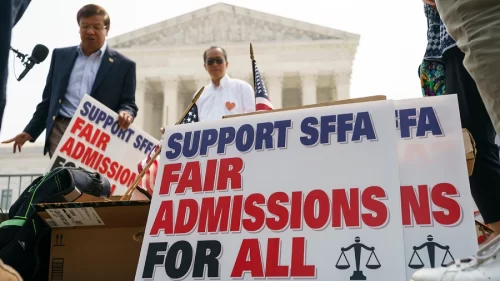The United States Supreme Court has declared that race cannot be used as a consideration in university admissions. The momentous decision upends decades-old US affirmative action rules, commonly known as positive discrimination.
It is one of the most divisive subjects in American education. Affirmative action entered policy in the 1960s and has been defended as a means of increasing diversity.
US President Joe Biden stated that he “strongly” disagreed with the much-anticipated decision made on Thursday.
“We cannot let this decision be the last word,” he stated. “Discrimination still exists in America.”
“This is not a normal court,” he remarked, referring to the nine judges, who are ideologically divided into six conservatives and three liberals.
According to Education Secretary Miguel Cardona, the court “took away a very important tool that university leaders used to ensure diversity on campus.”
“However, what it didn’t take away is the intent to ensure that our colleges are made up of beautifully diverse students, much like our country is,” he continued, adding that the White House will offer instructions to universities on how to legally retain diversity.
The decision concerned two admissions cases at Harvard and the University of North Carolina (UNC). The court ruled 6-3 in favour of UNC and 6-2 in favour of Harvard.
The justices sided with Students for Fair Admissions, an initiative headed by legal activist Edward Blum.
Last October, the group contended in court that Harvard’s race-conscious admissions strategy violated Title VI of the 1964 Civil Rights Act, which prohibits discrimination based on race, colour, or national origin.
“Many universities have for far too long wrongly concluded that the touchstone of an individual’s identity is not challenges overcome, skills developed, or lessons learned, but the colour of their skin,” wrote Chief Justice John Roberts.
His majority opinion called UNC and Harvard’s regulations “well-intended.”
Supreme Court Voted Against Affirmative Action
Furthermore, the Court stated that institutions should not be barred from taking into account an applicant’s “discussion of how race affects his or her life.”
“Harvard’s admissions process is based on the pernicious stereotype that a black student can usually bring something that a white person cannot offer,” Justice Roberts wrote.
Justice Clarence Thomas, the country’s second black justice and a conservative who has long advocated for the abolition of affirmative action, agreed.
Such programmes, he ruled, were “patently unconstitutional.”
“The self-proclaimed righteousness of universities does not give them licence to discriminate on the basis of race,” he stated.
Protesters assemble in front of the US Supreme Court during the hearing of affirmative action arguments concerning Harvard and the University of North Carolina admissions.
Ketanji Brown Jackson, the first black woman nominated to the Supreme Court, was among the liberal justices who disagreed. She called the decision a “tragedy for us all.”
“Today, the majority, with let-them-eat-cake obliviousness, pulls the ripcord and declares ‘colorblindness for all’ by legal fiat,” she wrote.
Sonia Sotomayor, another dissenting liberal justice, argued the decision “cements a superficial rule of colorblindness as a constitutional principle in an endemically segregated society.”
Students for Fair Admission
However, Justice Roberts contended that the dissenting judges had ignored elements of the statute that they disagreed with.
“Most troubling of all is what the dissent must make these omissions to defend: a judiciary that picks winners and losers based on the colour of their skin,” he wrote.
Mr Blum, the founder of Students for Fair Admission, praised his organization’s victory in the landmark decision.
He described it as “the beginning of the restoration of the colorblind legal covenant that binds our multi-racial, multi-ethnic nation together.”
“These discriminatory admission practises have undermined the integrity of our country’s civil rights laws,” he stated.
The Asian American Coalition for Education’s president, Yukong Zhao, told the BBC that he was pleased with the decision.
His group claimed that affirmative action has reduced Asian American students’ chances of enrolling in prestigious schools.
“This decision will protect meritocracy, which is the foundation of the American dream,” Mr Zhao said outside the court.
Others condemned the decision.
Angie Gabeau, president of the Harvard Black Students Association, told the BBC that she was “very discouraged” by the decision.
Ms Gabeau, 21, is in her final year at Harvard and believes her race “100% played a factor in my application,” including an application essay.
She is concerned that “students in this country who are affected by their race will now feel obligated to trauma-dump in their applications to show how race is affecting their lives.”
Harvard president Lawrence Bacow said in a statement that while the Ivy League school “will certainly comply with the court’s decision,” it will continue to include “people of many backgrounds, perspectives, and lived experiences.”
UNC Chancellor Kevin Guskiewicz stated that, while the judgement is not what the university “hoped for,” it will analyse it and “take any necessary steps to comply with the law.”
The judgement of the Supreme Court was ideological, with liberal Justice dissenting.
The verdict was welcomed as a “great day” by former US President Donald Trump, the current Republican contender for next year’s election.
Americans with “extraordinary ability and everything else required for success,” he added on social media, are “finally being rewarded.”
The Supreme Court has twice ruled in favour of affirmative action policies at US universities, most recently in 2016.
Arizona, California, Florida, Georgia, Oklahoma, New Hampshire, Michigan, Nebraska, and Washington are among the nine states that have previously banned race-based college admissions.
In California, voters rejected a 2020 ballot question to reinstate affirmative action, which had been prohibited for 24 years.
Many US liberals were outraged last year when the conservative-dominated Supreme Court voted to overturn Roe v Wade, a 1973 law that provided women abortion rights.
However, the political left has applauded some recent verdicts, including one on Native American child welfare and three others on election laws in Alabama, Louisiana, and North Carolina.
Supreme Court Upholds Tobacco Ban
U.S. Supreme Court Upholds California Ban on Flavored Tobacco Products






